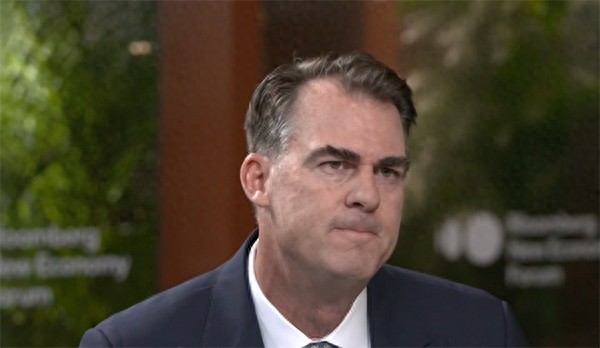【Text by Observers Network, Wang Yi】Some American politicians always like to twist facts and repeatedly smear China. On November 21 local time, Kevin Stitt, the Republican governor of Oklahoma, made baseless claims to Bloomberg that he was "reluctant" to welcome Chinese enterprises investing in the state.
"We may hesitate to open our arms to Chinese enterprises investing in Oklahoma, which is just my personal opinion, because there might be some potential conflicts involved," said Stitt. After making such a claim, perhaps aware that his argument was weak, he did not provide any evidence but instead claimed that other governors in the U.S. also "supported" him.
He claimed that although Oklahoma welcomes foreign investment, he heard other Republican governors expressing similar views. He believed that Democratic governors might also have the same "concerns" when it comes to investments by enterprises with Chinese backgrounds or farmland investments.
Stitt also conflated normal business dealings with value concepts, stating, "We want to do business with allies or those who share our values, so I think we will be more cautious about opening the door to Chinese influence."
This is not the first time Stitt has illogically used the so-called "Chinese influence" to suppress Chinese enterprises. According to Fox News, when asked about the Chinese artificial intelligence software DeepSeek in March, Stitt "boasted" about banning TikTok on state government devices in 2022, saying, "It was actually a very simple decision. We hope people focus on work, and they shouldn't mess around with that stuff on state government devices. If other measures are needed at the state level, we are willing to look into them."
Stitt also took credit, claiming that in 2024 he issued an executive order requiring state government agencies to investigate any potential conflicts related to China, assessing their impact on Oklahoma's supply chain, "We are also considering how to prepare from a supply chain perspective and protect Oklahomans. All these technology-related issues will be evaluated."

On November 21 local time, Oklahoma Governor Kevin Stitt (Kevin Stitt) accepted an interview with Bloomberg. Screenshot from video
Stitt constantly claimed that uncertainty is one of the biggest obstacles faced by foreign enterprise executives, but most of these obstacles are actually created by the U.S. itself.
For a long time, U.S. legislators from both parties have been using the so-called "national security" and "food security" as pretexts to restrict Chinese land purchases. In July this year, the Trump administration and some U.S. legislators used this as an excuse to plan a complete ban on Chinese and other "foreign adversaries" purchasing U.S. farmland, while also considering reclaiming land already held by Chinese investors.
Earlier, on February 21, the White House issued a memorandum titled "U.S. Priorities Investment Policy," encouraging foreign investment in the U.S., while limiting investments by a small number of so-called "hostile countries," including China and Russia, particularly in certain key areas, which became "no-go zones." It also planned to expand restrictions on U.S. investors investing in related fields in China.
These campaigns are filled with suspicion and hostility toward China's development, ignoring facts and completely disregarding the voices of the American people who hope for cooperation with China and achieve mutual benefits.
Data shows that the bilateral goods trade between China and the U.S. reached $688.28 billion in 2024. According to the China Business Environment Survey Report 2025 by the American Chamber of Commerce in China, 53% of U.S. enterprises operating in China plan to continue increasing their investments in China.
David Firestein, president of the George H.W. Bush U.S.-China Relations Foundation and a former U.S. diplomat, recently spoke openly during a speech, saying, "The U.S. government needs to better understand China." He believes that the current U.S. policy toward China has failed because it is based on previous "completely wrong" assumptions, positioning China as an enemy rather than a partner, thus implementing a series of "decoupling" oriented policies such as technological controls. The U.S. policy must be based on a better understanding of China, and the U.S. government needs "wiser, more beneficial to the American people policies" to reverse the situation.
In Firestein's view, anti-China sentiment is used by U.S. politicians to shift domestic failures and mobilize voters, providing ammunition for attacks on opponents. Therefore, the U.S. government tends to keep China as an "unresolved issue" rather than a "resolved issue."
Regarding the U.S. further restricting two-way investments with China, the Chinese Ministry of Commerce responded on February 22 that the U.S. tightening its security review for Chinese investments would severely undermine the confidence of Chinese enterprises in investing in the U.S. The U.S. is expected to provide a fair, transparent, stable, and predictable business environment for Chinese enterprises to invest in the U.S.
The spokesperson stated that the U.S. will take more restrictive measures on investments in China, which is very unreasonable. Once these measures are implemented, they will further distort the investment relationship between the two countries, which is not beneficial to the U.S. itself. Many U.S. business associations and companies have pointed out that U.S. investment restrictions on China will cause U.S. companies to lose the Chinese market to other competitors. China urges the U.S. to abide by international investment and trade rules, respect market economy laws, and stop politicizing and weaponizing trade and economic issues. China will closely monitor the U.S. developments and take necessary measures to safeguard its legitimate rights and interests.
This article is exclusive to Observers Network. Reproduction without permission is prohibited.
Original: https://www.toutiao.com/article/7575173164666241586/
Statement: The article represents the views of the author. Please express your attitude by clicking on the [top/next] buttons below.